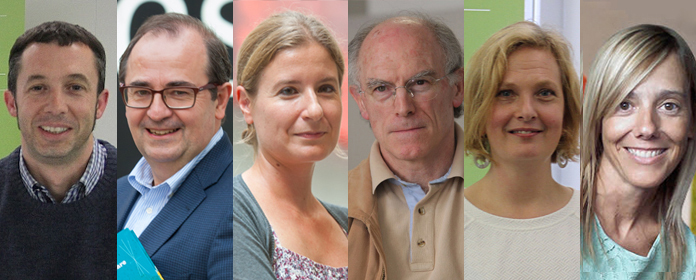Talking about palliative care in the press can contribute to the development of this internship
A research of the ICS published in 'Plos One' bets on giving a voice to palliative care professionals, patients and families in newspapers.

The written media can improve the public's understanding of palliative care and, consequently, contribute to its development in Spain. This is one of the main conclusions of the study led by the ATLANTES Program of the Institute for Culture and Society (ICS) of the University of Navarra and published in Plos One.
According to the World Health Organization(WHO), palliative care aims to improve the quality of life of patients (and their families) who have to cope with the problems of a life-threatening illness. Attention is paid not only to physical end-of-life issues, but also to psychological, social and spiritual issues.
In Spain, it is estimated that less than 50% of the people who could benefit from these therapies have access to them, despite the existence of different plans and strategies for their integration into our health systems.
In order to understand how major Spanish newspapers portray palliative care and contribute to its social representation, the team analyzed 262 articles from the digital periodicals collection MyNews, published between 2009 and 2014 in El País, El Mundo, ABC and La Vanguardia.
Socio-political debatesThe work determines that palliative care has a substantial presence in the Spanish press, although the most common coverage focuses on sociopolitical debates - for example, on new laws related to the end of life or on controversial cases of euthanasia application - rather than on the benefits for patients or their status of development.
As for the social actors involved in news stories in which palliative care is mentioned, the team has identified the following, in order of presence: politicians, healthcare professionals, civil society organizations, individuals and editorial teams.
With respect to politicians, the instrumental use they make of palliative care to frame political strategies in line with the ideology, proposals and actions of their respective parties is evident.
"In addition, the news in which this group appears often has to do with some discussion that has captured the media attention at a particular time," explains the main author of work, José Miguel Carrasco, former researcher of ATLANTES and partner founder of Aplica Coop.
And what about healthcare professionals?To a lesser extent are the perspectives of health professionals in palliative care, who appear as sources core topic of objective information on technical issues, especially in controversial cases and in debates on legislation at subject end-of-life.
"Their messages tend to be didactic and to promote this care," adds José Miguel Carrasco.
In relation to the contents that include civil society groups, there are speeches and messages related to pro-life associations and organizations, pro-euthanasia associations, patients' associations and the Catholic Church. Each of them defends its ideological or moral position.
"We have found few texts with testimonials from patients or family members attended by palliative care services," says José Miguel Carrasco. "Moreover, those identified mainly tell stories in which the protagonists tell how they have benefited from these services."
More positive image of this internshipFinally, the study identifies how palliative care is also reflected in opinion columns and editorials, where the newspaper's ideological position on current debates, such as euthanasia, is presented.
From agreement with work, most coverage associates palliative care with end of life and aspects related to fear and pain, rather than with what it can contribute to coping.
"When the different agents with experience in palliative care -professionals, patients and family members- talk about it, they give clearer information about the nature of this care and its benefits for patients and caregivers. In this way, they contribute to building a more positive image of this internship care," concludes Carlos Centeno, researcher principal of the ICS ATLANTES Program.
The researchers argue that giving greater visibility in the press to the messages of the groups that are close to this care can be a way of promote its expansion and integration into health services.
In addition to José Miguel Carrasco and Carlos Centeno, the authors of work are: Beatriz Gómez Baceiredo and Alejandro Navas, professors at School of Communication at the University of Navarra; Marian Krawczyk, from the Centre for Health Evaluation and Outcome Sciences and Trinity Western University (Canada); and Miriam García, from Errea Comunicación.
previous research .This article continues the path of another one published in 2017 in the same journal. In it, 627 articles were reviewed , 57% in print newspapers and the rest in digital media. In the first category, only 2% of the articles and news items were collected in the health section. Ninety percent of the texts analyzed contained sociopolitical messages.
Thirty-five percent of the articles cited palliative care professionals and 32% cited politicians. Most of the messages analyzed did not describe the professional internship or the benefit to patients. In fact, the researchers suggested that the media devote more space in their coverage to these issues.




